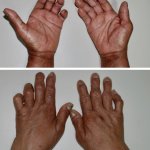Lastly, the zebra hunt is dangerous because we miss all the horses in front of us. We are incredibly fortunate to be in a field whose hunting grounds are so vast that we routinely see both horses and zebras. When we look so hard for uncommon conditions, we completely forget the diagnoses that are lurking in front of our very eyes. At its extreme, patients with very mundane complaints are subject to exhaustive evaluations without providing any substantive answers. Besides, in spite of being commonplace, horses can be fascinating as well.
It is undeniably enjoyable to hunt for zebras. Bagging one and displaying your winnings majestically in the form of a case report or presentation are even more delightful. But we have to reel in our exuberance and become more acutely aware of the ramifications of our hunt. It doesn’t mean the zebras aren’t out there and that there isn’t virtue to working up a patient for a rare or exotic disease, but we should first be sure that what we are looking at isn’t just a funny-looking horse. We have to expend our bullets wisely and rein in our vanity in favor of empathy and understanding so that when we hunt zebras, we aren’t just shooting ourselves in the foot.
Bharat Kumar, MD, is a second-year fellow at the University of Iowa pursuing a dual-certification pathway in rheumatology and allergy/immunology. Dr. Kumar has a special interest in medical education, journalism and ethics. Follow him on Twitter and check out his website.
Reference
- Sotos JG. (2006; 1991). Zebra Cards: An Aid to Obscure Diagnosis. Mt. Vernon, VA: Mt. Vernon Book Systems.



